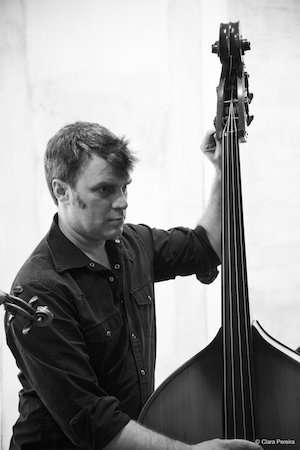By Filipe Freitas
Todd Sickafoose by © Clara Pereira, 2020
Name: Todd Sickafoose
Instrument: bass
Style: modern creative, avant-garde jazz
Album Highlights: Tiny Resistors (Cryptogramophone, 2008); Bear Proof (Secret Hatch, 2023)
We had the chance to hear the music in your latest album, Bear Proof, at The Zurcher Gallery in New York on the occasion of the Winter JazzFest 2020. Having composed the material, why did it take you so long to release this album? And what were the reasons for a 15-year hiatus as a bandleader (Tiny Resistors came out in 2008)?
Yes, that was a lovely evening and a great venue. Well the truth is – I was making Tiny Resistors-related music most of those years, I just evidently was more interested in making it than releasing it. Bear Proof was recorded in 2014, after a blitz of performances on the West Coast, and even before that, in 2011, I’d recorded another set of music in Brooklyn with a very similar band to Tiny Resistors. But with a young family, a busy touring and producing schedule, and Hadestown becoming a whirlwind of activity, it was easy to put my own recordings on hold. Nice to start rectifying that now.
Musically, Bear Proof was sort of a reaction to Tiny Resistors. Where that record represents a studio-focused way of approaching a jazz aesthetic – layers and collage and overdubs are all part of the sound – Bear Proof seeks to swing the pendulum the other way. This time, the complex textures and transitions are more scripted – they are written carefully into the hour-long piece. So you get a rich, sometimes unpredictable palette with a kaleidoscope of instrumental combinations, but it’s very repeatable from performance to performance. That’s what I was going for anyway! I will probably swing back the other way again because I love studio creativity too.
What is your compositional process? Do you write with specific musicians in mind?
Yes. Very much so. If you’re really inviting a musician’s full creativity into the music, it’s a necessity. These musicians mean so much to me, and our history together is deep. So it’s about assembling personalities – musicians who totally delight me, and each other, and get my mind revving as a composer. You can hear detail in the way they might phrase a melody and you also can have a strong intuition about the kinds of spaces that would be ideal for them to improvise in. I think I veered towards more folky or chamber music instruments for this particular project – instruments with less jazz baggage and the ability to blend in unique acoustic ways. The accordion is a bit of a secret weapon in this context, at least to my ears. It adds something three-dimensional to almost any combination. In a room all together, these eight instruments can sound like a mini- orchestra.
As for the compositional process, I had lots of interrelated sketches that I’d made ruminating on this idea of what Bear Proof could be – the ritual of playing it through like a long, wordless story. I eventually got the sketches mapped out in the right order, with the right emotional arc, and then set about composing the exact arrangements. Something like the end of “Magnetic North” – I knew I wanted to break away from the song to make a slow, anxious descent and get to the right zone for unaccompanied piano interlude, but it wasn’t until actually writing that I figured out what it could be: a smearing of the droning pitches one flat at a time through the circle of fifths until they came out the other side again. The fun was in the detail, in other words, and it all came together pretty quickly.
Your work goes beyond jazz, and your decades-long collaboration with Ani DiFranco shows your openness to other styles. How does it all fit together?
Yes I’m a bit of a musical omnivore, and so are most of the people I hang out with. None of us are purists or stylists, so we’re always using whatever musical building blocks seem most suited to the moment. I think we see the jazz in everything, which is to say the possibility for true group spontaneity and discovery. Once you crack that open, it’s a borderless world.
You’re also known for your work as a producer/arranger. Was this something you’ve always wanted to do or did it just occur without planning?
I’ve always had a deep interest in every part of music-making and the effect it all has on the whole. As a teenager I was “producing” recordings with friends on 4-track tape machines, and getting under the hood of whatever I could. In my twenties, I acquired more skills and producing & mixing music became a bigger part of my work. It’s a blessing and a curse because there are only so many hours in the day, but I love wearing many hats.
Projects for the near future?
Lots of things in the works. First off, I’ve already written the next batch of Tiny Resistors music, so I’m itching to begin recording that. Most of it was written while my family temporarily lived in Oaxaca, Mexico, last year – maybe there will be even more low brass. I’m a few years into making a 24-hour piece of climate-related music that will eventually exist as a recording, a website, and a museum sound installation. I’m collaborating once again with my friend Amy Martin on her environmental podcast “Threshold”, which I think is just so, so moving. And I’m beginning work on another Broadway musical too, which I can’t say much about, but don’t worry: it’s another weird one.

